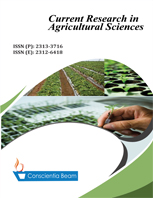Adoption and Perception of Farmers towards Attributes of Improved Teff (Quncho) Varieties: Evidence from Benishangul-Gumuz Region of Ethiopia
DOI:
https://doi.org/10.18488/journal.68.2019.62.68.82Abstract
Adoption and wider diffusion of improved Teff varieties (Quncho) are playing a vital role overriding present situation of food insecurity in many parts of Ethiopia. However, the use of improved teff varieties are constrained by various factors. Hence, in this study, an attempt was made to examine factors affecting the adoption and use of improved teff varieties (Quncho) regarding attributes of varietal preferences of small-holder farmers. A multi-stage random sampling technique was employed to select 249 sample households from Assosa district and Mao-Komo special district. Descriptive statistical tools like mean, percentage, frequency distribution and t-test were used to summarize the characteristics of the sampled households. Both descriptive and inferential statistics were used to analyze the data collected during 2015/16 production season. About 58.23% of the sampled household were adopters while 41.77% of them didn’t adopt improved Teff varieties (Quncho) in the study area. The finding of this study suggest that farmers in the area seek specific varietal attributes, such as yield potential, tolerance to disease and lodging, better Teff grain price and color, etc. The farmers’ preferences with improved Teff varieties-specific characteristics significantly determine adoption decisions, which suggests the need to go beyond the commonly considered socio-economic, demographic and institutional factors in the adoption process. There is a need to target small-holder farmers’ characteristics, priorities and production constraints while improved Teff varietal developments considering users preferences. Therefore, the research centers and extension system has to give more attention to participatory research which considers farmers’ priorities and needs.

